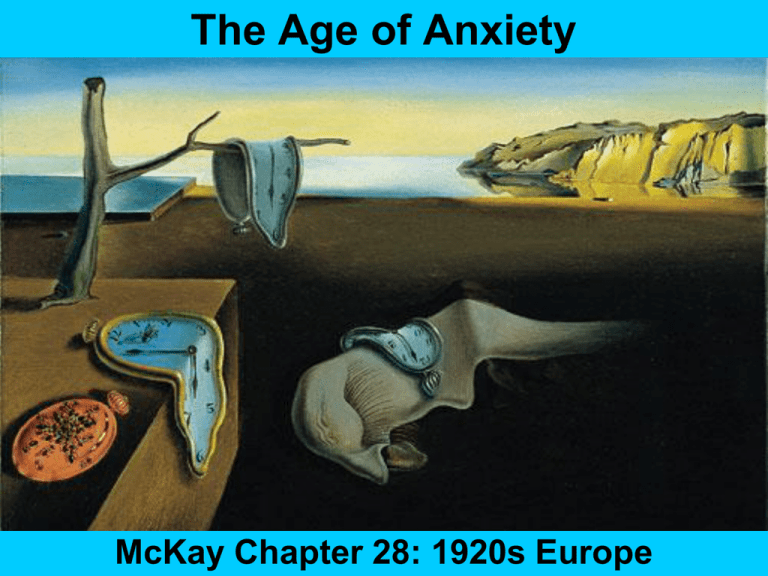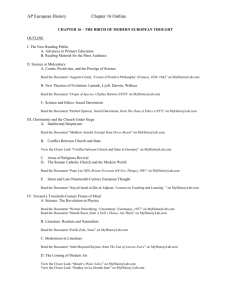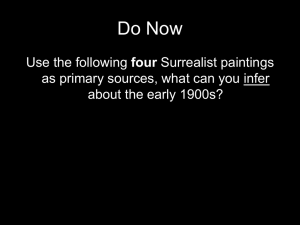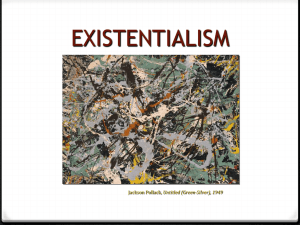The Age of Anxiety McKay Chapter 28: 1920s Europe
advertisement

The Age of Anxiety McKay Chapter 28: 1920s Europe Victorian Era/ La Belle Epoch/ Gilded Age Weltanschauung Pierre-Auguste Renoir, Dance at Le Moulin de la Galette, 1876 Gustave Caillebotte, (1848–1894), Paris Street, Rainy Day, 1877 Victorian Era/ La Belle Epoch/ Gilded Age Paradigm • Golden Age of Bourgeosie • Peace (Pax Britannica ) • Belief in Progress • leisure time • Faith in Technology • Prosperity • faith in science/ reason • Supreme confidence World War I Victorian Era/ La Belle Epoch/ Gilded Age Paradigm The storm has died away and still we are restless, uneasy, as if the storm were about to break…among all these injured things is the mind. The mind has indeed been cruelly wounded…it doubts itself profoundly. French poet Paul Valery (1922) Europe in 1919 Europe’s Wounded Soul • • • • • WWI shattered Europe’s intellectual paradigm Noted irrational and violence in humans – Paul Valéry’s Crisis of the Mind (p. 922) • wrote about the crisis of the cruelly injured mind • war ("storm") had left a "terrible uncertainty" Questioned liberal beliefs that had guided it since the Enlightenment Uncertain about progress & reason No longer sure of a knowable orderly Newtonian society Otto Dix: Noted for his ruthless and harshly realistic depictions of Weimar society and of the brutality of war, Friedrich Nietzsche • Friedrich Nietzsche – believed that Western civilization was in decline – Ambition, the striving to reach the highest possible position in life (Struggle) drive human progress – Power is ultimate virtue – Mankind weakened by Christianity and Judeo-Christian virtures – “Slave Morality” which praised humility, the weak – W. Civ overstressed rational thinking at the expense of emotion and passion – But claims that marriage for love should be left to the rabble – The best should mate with the best – “God is dead.” Western Christians no longer really believed – The Will to Power • Stipulated that a few superior supermen had to become the leaders of the herd of inferior people • How is a superman created? – Eugenics, severe/ stoic education – A superman is beyond good and evil – He is fearless = he is good – Very influential among German radicals The reaction of paltry people : Love provides the feeling of highest power. It should be understood to what extent, not man in general, but only a certain kind of man is speaking here. " We are godly in love, we shall be ' the children of God ' ; God loves us and wants nothing from us save love " ; that is to say : all morality, obedience, and action, do not produce the same feeling of power and freedom as love does ; a man does nothing wicked from sheer love, but he does much more than if he were prompted by obedience and virtue alone. Here is the happiness of the herd, the communal feeling in big things as in small, the living sentiment of unity felt as the sum of the feeling of life. Helping, caring for, and being useful, constantly kindle the feeling of power; visible success... Much can I bear. Things the most irksome I endure with such patience as comes from a god. Four things, however, repulse me like venom : Tobacco smoke, garlic, bugs, and the cross… The profound contempt with which the Christian was treated by the noble people of antiquity, is of the same order as the present instinctive aversion to Jews: it is the hatred which free and self- respecting classes feel towards those who wish to creep in secretly, and who combine an awkward bearing with foolish self-sufficiency. The Will to Power by Friedrich Nietzsche "...the Jews achieved that miracle of inversion of values thanks to which life on earth has for a couple millennia acquired a new and dangerous fascination--their prophets fused 'rich', 'godless', 'evil', 'violent', 'sensual' into one and were the first to coin the word 'world' as a term of infamy. It is this inversion of values (with which is involved the employment of the word for 'poor' as a synonym for 'holy' and 'friend') that the significance of the Jewish people resides: with them there begins the slave revolt in morals.“ On the Genealogy of Morality by Friedrich Nietzsche • Modern philosophy Existentialism – Søren Kierkegaard =father of existentialism – Basic Principles: • Life is not fair, (bad things DO happen to good people) BUT • Humans can overcome the meaninglessness of life by individual action • individuals create the meaning and essence of their lives, as opposed to deities or authorities creating it for them – Absence of a transcendent force (such as God) means that the individual is entirely free, and, therefore, ultimately responsible (for his/her choices) – Up to humans to create an ethos (values) of personal responsibility outside any branded belief system Edvard Munch’s The Scream (1893 represents the universal anxiety of modern man “They (human-beings) turn up, appear on the scene.” Man is condemned to be free.” Jean-Paul Sartre The revival of Christianity • • Christianity under attack since Enlightenment Before WWI theologians tried harmonize religious belief with scientific – • • Played down the role of miracles and stressed Christ as a moral teacher A revitalization of fundamental Christianity took place after World War I Christian Existentialism – Soren Kierkegaard (1813-1855) revived • Led a back-to-basics movement • criticized the worldliness of the church and stressed commitment to a remote and majestic God • Each individual must choose how to exist in order to live an authentic life – Karl Barth (1886-1968) • stressed the imperfect and sinful nature of man • Man can not “reason out” God’s ways – T.S. Eliot, C.S. Lewis & other literary figures were caught in in revival • Graham Green – “One began to believe in heaven because one believed in hell.” • The new physics Pre 1920 physics was based on a Newtonian weltanschauung – World machine – People were comforted be science’s certainty in a time when “God is dead.” – Planck and Einstein undermined belief in constant natural laws • Plank – work with subatomic energy showed that atoms were not the basic building blocks of nature (protons & neutrons) • Einstein – E=MC2 – postulated that time and space are relative » They can be altered (curved) with energy » the universe is infinite – matter and energy are interchangeable – Rutherford • Atom was not smallest, solid matter • Identified subatomic particles (neutron) – new physics • instead of Newton's rational laws, there are only tendencies • The world was not a perfect predictable harmonious machine!!!! Freudian psychology • • Prior to Freud, it was assumed that the conscious mind processed experiences in a rational and logical way According to Freud, human behavior is basically irrational – key to understanding the mind is the irrational unconscious (the id), which is driven by sexual, aggressive, and pleasure seeking desires – Behavior is a compromise between the needs of the id and the rationalizing conscious (the ego), which mediates what a person can do, and ingrained moral values (the superego), which tell what a person should do • Instinctual drives can easily overwhelm the control mechanisms; yet rational thinking and traditional moral values can cripple people with guilt and neuroses. • Many interpreted Freudian thought as an encouragement of an uninhibited sex life Twentieth century literature • The postwar moods of pessimism, relativism, and alienation influenced novelists • Literature focused on the complexity and irrationality of the human mind • Writers such as Proust embraced psychological relativity--the attempt to understand oneself by looking at one's past • Novelists such as Woolf, Faulkner, and Joyce adopted the stream-ofconsciousness technique, in which ideas and emotions from different time periods bubble up randomly • Some literature, such as that of Spengler, Kafka, and Orwell, was anti-utopia--it predicted a future of doom The Waste Land A heap of broken images, where the sun beats, And the dead tree gives no shelter, the cricket no relief, And the dry stone no sound of water… Hooded hordes swarming… Falling towers Jerusalem Athens Alexandria Vienna London Unreal T.S. Eliot (1922 Modern painting • French impressionism replaced with to nonrepresentation al expressionism – sought to portray the worlds of emotion and imagination – Van Gogh, Gauguin, Cézanne, and Matisse Vincent van Gogh Starry Night 1889 Paul Gauguin Tahitian Women [On the Beach]) 1891 Themes in Early Modern Art 1. Uncertainty/insecurity. 2. Disillusionment. 3. The subconscious. 4. Overt sexuality. 5. Violence & savagery. Edvard Munch: The Scream (1893) There’s no such thing as Santa?!?!?!? Expressionism Using bright colors to express a particular emotion Reflects a zeitgeist of anxiety, uncertainty Franz Marc: Animal Destinies (1913) Gustav Klimt: Judith I (1901) Secessionists Disrupt the conservative values of Viennese society. Obsessed with the self. Man is a sexual being, leaning toward despair Gustav Klimt: The Kiss (1907-8) Georges Braque: Violin & Candlestick (1910) CUBISM The subject matter is broken down, analyzed, and reassembled in abstract form. Cezanne The artist should treat nature in terms of the cylinder, the sphere, and the cone. Georges Braque: Woman with a Guitar (1913) Pablo Picasso: Les Demoiselles d’Avignon (1907) Picasso: Studio with Plaster Head (1925) Pablo Picasso: Guernica (1937) Marcel Duchamp: Nude Descending a Staircase (1912) George Grosz Grey Day (1921) DaDaism Ridiculed contemporary culture & traditional art forms. The collapse during WW I of social and moral values. Nihilistic George Grosz The Pillars of Society (1926) Raoul Hausmann: ABCD (1924-25) Marcel Duchamp: Fountain (1917) Salvador Dali: Soft Construction with Boiled Beans (Premonition of Civil War), 1936 Surrealism Late 1920s-1940s. Came from the nihilistic genre of DaDa. Influenced by Feud’s theories on psychoanalysis and the subconscious Confusing & startling images like those in dreams Salvador Dali: The Persistence of Memory (1931) Salvador Dali: The Apparition of the Face and Fruit Dish on a Beach (1938) Salvador Dali: Geopoliticus Child Watching the Birth of a New Man (1943)





